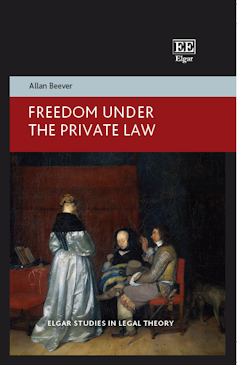The rule of law is fundamental to a free society – so why don’t NZ courts always uphold it?
- Written by Allan Beever, Professor of Law, Auckland University of Technology

Ever since the 17th century, the rule of law[1] has been regarded as one of the fundamental values of a free society. It means you cannot be forced to do something unless there is a law requiring you to do it.
It also means people in power can coerce you only if there is a rule justifying it. This is the opposite of the “rule of persons”, in which the rulers have arbitrary power: they have the authority to force you to do things simply because they think those things should be done.
In free societies, the courts are the chief institution tasked with upholding the rule of law. It is their job to police government and other officials, to make sure they act only in accordance with the law.
But no one polices the courts. If they uphold the rule of law in their own decisions, that’s fine. But increasingly often, they don’t. And this raises important questions about how we want to be governed as a society.
The role of judges
Take, for example, the law of negligence. This is an area of law that allows one person to sue another for injuries that have been carelessly inflicted. To work, the law requires a test that will tell us when a person can sue.
The current approach reads like a set of rules, but basically comes down to two steps[2]: a judge needs to consider everything that relates to the relationship between the parties; and the judge then needs to consider everything else.
In the end, then, the “rule” is to consider everything. It is surely clear that this not really a rule. It is rather an open discretion pretending to be a rule.
Read more: High, Supreme, Federal, Family, County – what do all our different courts actually do?[3]
Consider also the law of trusts. This is a difficult and technical area of the law, but we can describe what the New Zealand courts have permitted in simple terms.
Imagine you own some property that I am looking after. I then enter into a relationship. My partner helps me look after the property. Eventually, our relationship breaks down and she wants some reward for the work she has done.
She may well be entitled to reward from me, but the courts in this country have dealt with this problem by allowing partners to claim part ownership of the property (as happened in the case of Murrell v Hamilton[4] in 2014, for example).
The problem is this violates fundamental principles of property law. You owned the house from the beginning. How, then, can what went on in my relationship mean my partner came to own what was your property?
The ‘rule of persons’
That this was possible saw one leading legal commentator observe[5] that, “in effect theft was being sanctioned by the courts”.
Why has this happened? Because, although the rules of property law would not permit it, the judges think the outcome is fair. If this is not the “rule of persons”, what is?
There are other examples, but one more will suffice. Imagine I do something horrible to you. If it’s a crime, I can be punished by the criminal law. But the courts have also said that if you sue me, a court may impose a monetary punishment on me that will go to you (effectively a fine).
When will such punishment be justified? Some leading New Zealand judges, including the previous chief justice, have said this punishment is justified not on the basis of some rule, but when a judge finds my behaviour to be sufficiently outrageous. (See, for example, the cases of Bottrill v A[6] from 2001 or Couch v AG[7] from 2010).
In other words, the position is that I can be punished if a judge thinks I behaved badly enough. Could it be any clearer this is the rule of persons and not the rule of law?
Read more: White-collar criminals benefit from leniency provisions in NZ law – why the disparity with other kinds of crime?[8]
Rule by experts
The judges who advanced this view were outvoted by the other judges who presided in those cases. But it would be wrong to conclude all is well. As another recent case showed[9], the idea remains attractive to judges.
References
- ^ rule of law (www.justice.govt.nz)
- ^ two steps (www.nzlii.org)
- ^ High, Supreme, Federal, Family, County – what do all our different courts actually do? (theconversation.com)
- ^ Murrell v Hamilton (www.nzlii.org)
- ^ observe (ojs.victoria.ac.nz)
- ^ Bottrill v A (www.nzlii.org)
- ^ Couch v AG (www.nzlii.org)
- ^ White-collar criminals benefit from leniency provisions in NZ law – why the disparity with other kinds of crime? (theconversation.com)
- ^ recent case showed (www.nzlii.org)
- ^ Freedom under the Private Law (www.e-elgar.com)

















